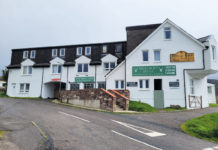Land tax on pension transfers is the latest blow to the commercial sector, writes Alan Gordon of DM Hall

WHEN commercial property is such a vital component of a country’s economic success, it is a struggle to understand why authorities seem to view the sector as a cash cow to be mercilessly milked.
The impositions on the sector have come thick and fast in recent years and even professionals who have been in the market for decades can hardly remember a more unremittingly punishing tax regime.
This is not to single out any particular party, since the political instinct to squeeze as much out of the revenues from commercial and industrial properties appears to be pretty much across the board.
The latest plan by Revenue Scotland is to impose land and buildings transaction tax (LBTT) on in specie transfers of commercial properties between self-invested personal pensions (Sipps) for the same pension investor.
In specie means ‘in the actual form’ in Latin. It means to transfer the ownership of an asset from one person, company or entity to another in its current form, without the need to convert the asset to cash. It is the sort of mechanism used by Sipp investors who might want to transfer a property into a better-performing or more economic scheme. Until late last year, such transfers were tax exempt.
Revenue Scotland argues that such transfers give rise to an LBTT liability on the basis that they are land transactions. However the pension investor will almost certainly have paid LBTT, or its predecessor, on the original purchase of the property.
This suggests a new regime of double taxation, something which is at odds with some 25 years of practice within HMRC. There has been no indication from HMRC that the equivalent exemption will be removed in England and Wales.
While previously a £1 million commercial property transfer would have incurred zero stamp duty, now investors would face a tax charge of more than £35,000. There are serious concerns the plan could cost Scotland millions of pounds in investment.
There are many individuals who now invest their pension funds in commercial property, especially after recent punitive changes to the tax regime in the residential buy-to-let market across the UK.
These investors have been instrumental in providing vital support for sectors of the market which have been languishing; by investing in properties such as small industrial units or retail units in hard-pressed shopping parades. They have established a healthy private landlord base.
The Scottish Government hit the market hard last year when it limited the empty property relief which attaches to vacant commercial premises. This valuable benefit was reduced from 100% relief from rates to 10% after three months, meaning that landlords face a 90% charge on non-earning buildings.
Similar curbs on the office market – which devastated it – were a harbinger of things to come when they were introduced more than four years ago.
Just this year, Holyrood decided to levy water and sewerage charges on vacant non-domestic properties which hitherto have been exempt from charges; they will now be billed as if they were occupied.
On top of that, the recent rating revaluation caused anguish across the sector, with some businesses claiming that they were faced with bills four times more than they had previously.
Elected officials have every right to impose whatever tax regime they see fit. There are many elegant theories about taxation to which they can point to justify their decisions.
But it might be politic to remember an older story – the one about the Golden Goose.























